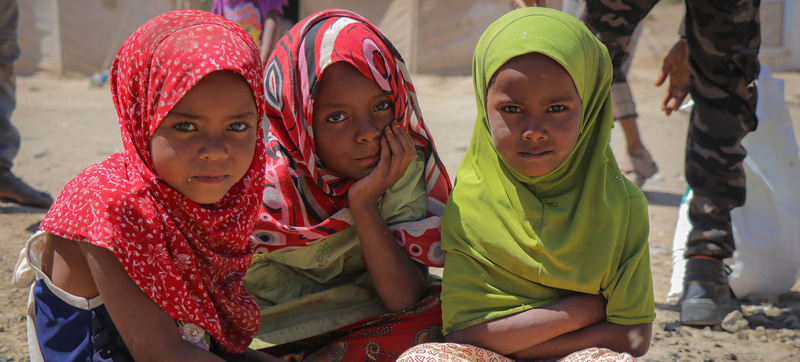 War Crimes
War Crimes New York: UN experts called on the Security Council on Thursday, along with the international community at large, to put an end to the “surreal and absurd dimension” of human rights violations engulfing war-torn Yemen, where abuses continue unchecked.
“Civilians in Yemen are not starving, they are being starved by the parties to the conflict”, said Kamel Jendoubi, the Chairperson of the UN Group of Eminent International and Regional Experts on Yemen, in the closed session.
The conflict in the Arab world’s most impoverished nation ramped up in 2015, when fighting erupted between a Saudi-backed coalition supporting the internationally recognized Government, and the Houthi rebel group, which is known formally, as Ansar Allah.
Figures released on Tuesday from the UN humanitarian office, OCHA, suggest that more than 230,000 Yemenis have died due to the war, the majority – some 131,000 - through indirect causes such as lack of food, health services and infrastructure. Over 3,000 children have been killed, and 1,500 civilians casualties have been reported in the first nine months of this year.
‘Rampant levels’ of violations
The UN rights experts outlined to ambassadors serious violations of international human rights and humanitarian law, which encompassed indiscriminate mortar attacks; laying of landmines; recruitment of child soldiers; and the use of torture, including sexual violence while in detention.
“Our investigations this year have confirmed rampant levels of serious violations of international human rights law and international humanitarian law, many of which may amount to war crimes”, Mr. Jendoubi continued.
Against that backdrop, the Group called on the Council to end impunity, expand sanctions and refer the situation to the International Criminal Court (ICC).
No safe place
This year’s continuation of violations “underlines the complete lack of respect for international law and human life being displayed by parties to the conflict”, said Mr. Jendoubi.
“For civilians in Yemen, there is simply no safe place to escape the ravages of the war”.
No clean hands
The Group stressed that there are no clean hands in the war and that all parties to the conflict bear responsibility.
They cited their third report, which concluded that violations have been committed by the government, Houthis, separatist Southern Transitional Council, and members of the Coalition, in particular Saudi Arabia and United Arab Emirates.
Yet, to their knowledge, no combatants have so far been held accountable.
The group reiterated its call for “third States” beyond the immediate combatants, to stop transferring arms to the parties, in light of the role that such transfers are playing in perpetuating the fighting, and contributing to abuses.
Moreover, Mr. Jendoubi maintained that the continued supply of weapons into the conflict “is only perpetuating the conflict and prolonging the suffering of the Yemeni people”.
The Group of Experts called upon the Ambassadors to expand the Security Council sanctions’ list and to fully integrate human rights into its regular agenda, which they maintained “would send a powerful message to the conflicting parties that there will be no impunity for serious violations of human rights”.
Record levels of hunger
At the same time, new figures revealing record levels of acute food insecurity in Yemen have prompted the UN Children’s Fund (UNICEF), Food and Agriculture Organization (FAO) and World Food Programme (WFP) to issue a joint statement warning that the window to prevent famine there is narrowing.
They pointed to the latest Integrated Food Security Phase Classification (IPC) analysis saying that more than half of the 30-million-strong population, risk slipping into “worsening levels of hunger” by mid-2021.
“Yemen is on the brink of famine...make no mistake, 2021 will be even worse than 2020 for Yemen’s most vulnerable”, said WFP chief David Beasley. “These alarming numbers must be a wake-up call to the world”.
FAO chief QU Dongyu acknowledged that “maintaining the flow of food is imperative, but this cycle cannot continue forever” and upheld that “Yemen needs a cessation of conflict, which is the primary driver of food insecurity in the country”.
Financial gaps
And although humanitarian support is critical to preventing famine and saving lives, significant funding shortfalls threaten to cut lifeline food assistance and life-saving malnutrition treatment services.
“The world cannot stand by as Yemen slips into famine and millions of vulnerable children and families go hungry”, stressed UNICEF chief Henrietta Fore.
“The situation is already catastrophic, and without urgent action, more children will die”, she cautioned. “We have prevented famine in Yemen before, and we should be able to prevent it again, with increased support and with unimpeded access to every child and family in need”.
Support Our Journalism
We cannot do without you.. your contribution supports unbiased journalism
IBNS is not driven by any ism- not wokeism, not racism, not skewed secularism, not hyper right-wing or left liberal ideals, nor by any hardline religious beliefs or hyper nationalism. We want to serve you good old objective news, as they are. We do not judge or preach. We let people decide for themselves. We only try to present factual and well-sourced news.







